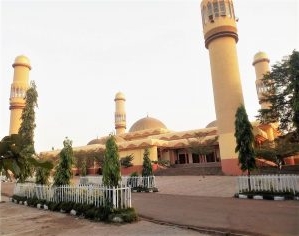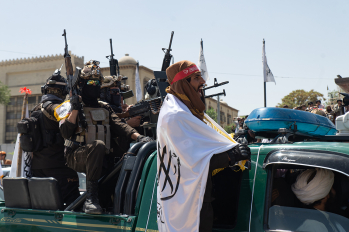
Fulani herdsmen attacked two villages in northwest Nigeria’s Kaduna state early on Sunday (Sept. 7), killing eight Christians and wounding nine others.
Area resident Timothy Kimbe said herdsmen attacked Wakeh and Gadanaji villages in Kachia County between 5 a.m. and 6 a.m.
“What a black Sunday for Kachia Christians,” Kimbe told Christian Daily International-Morning Star News. “Fulani Muslim herdsmen have killed eight Christians and injured nine other Christians in Wakeh and Gadanaji.”
Kimbe identified those killed as Elisha Pius, Japhet Bitrus, Obadiah Joshua, Luka Augustine, Paul Augustine, Ezekiel Augustine, Ishaya Paul and Bawa Bulus. Wounded were Sanda Ishaya Christopher, Zachariah Anthony, Sunday Nuhu, Gideon Pius, Gregory Moses, Livinus Gabriel, Godday Clement, Ishaku Elisha, and Godday Clement, he said.
Plateau State Attacks
In neighboring Plateau state, herdsmen have attacked 11 villages in the Qua’an Pan area, burning more than 30 houses and displacing at least 300 Christians, since late August, sources said.
Nteng, Doop, Zhep Morop, Gyeergu, Kelaghan, Loon, Kwakii and Gorom in Doemak District were some of the villages attacked, said Danaan Cletus Sylvanus, spokesman for the Qua’an Pan Local Government Council.
Council Chairman Christopher Manship has held a stakeholders meeting and called on residents to be vigilant, Sylvanus said in a press statement.
“Manship lamented over the attacks and urged traditional rulers, religious leaders, and development associations to join hands with him to work towards a permanent solution to the attacks,” Sylvanus said. “The chairman has mobilized security agencies to the affected areas to ensure the situation is brought under control. We are working tirelessly to restore peace and normalcy to the communities.”
Alphonsus Komsol, a former legislator from the area in the National Assembly, described the attacks as “acts of barbarism, inhuman and unacceptable.” In a press statement, he urged affected Christians to remain vigilant and unite in protecting their communities while avoiding any actions that could escalate tensions.
Joe Bukar, a legislator in the Plateau State Legislature, said the Plateau State House of Assembly on Sept. 4 deliberated on the security situation in Qua’an Pan Local Government Area and called on the Nigerian government authorities to take immediate steps against the armed marauders.
“We deliberated on the disturbing attacks in Nteng, Doemak District of Qua’an Pan LGA, where lives have been lost, homes destroyed, and families displaced,” Bukar said. “We unanimously called on the federal government, National Assembly and security agencies to act urgently in restoring peace, while also urging Plateau State Emergency Management Agency (PLASEMA) to provide relief for the victims.”
A statement from the chambers of the Plateau State House of Assembly over the attacks in Qua’an Pan called on the Nigerian government to immediately halt the herdsmen attacks.
“The Plateau State House of Assembly has raised concern over the rising spate of coordinated attacks on communities in Nteng, Doemak District of Qua’an-Pan Local Government Area, with a strong call on the federal government and the National Assembly to urgently intervene in addressing the worsening security situation,” the statement reads. “The motion was moved under matters on adjournment by the Member representing Qua’an-Pan North Constituency, Hon. Owen Dagogot, and co-sponsored by the Member representing Qua’an-Pan South, Hon. Theodore Maiyaki (SAN).”
Dagogot drew the attention of the House to recurring violent attacks by armed militias in Do’op, Loon, Larwan and Gorom communities in the last six to seven weeks that led to deaths, destruction of property, burned farmlands and mass displacement of residents.
“While condemning the persistent attacks, the House stressed that security is on the Exclusive Legislative List, and therefore called on the National Assembly to direct the Chief of Defense Staff, the Inspector General of Police, and other relevant security agencies to act decisively in restoring peace,” Dagogot said. “The House also appealed to the Plateau State Emergency Management Agency (PLASEMA) to conduct an on-the-spot assessment of the affected communities and provide relief and support for victims.”
After extensive deliberation and contributions by members who voiced strong concerns over recurring violence, the House unanimously adopted the resolution. The Clerk of the House was directed to produce clean copies of the resolution and forward same to the president, the Senate president, the speaker of the House of Representatives, the chief of Defense Staff, the inspector general of police and other relevant federal agencies for urgent action.
Numbering in the millions across Nigeria and the Sahel, predominantly Muslim Fulani comprise hundreds of clans of many different lineages who do not hold extremist views, but some Fulani do adhere to radical Islamist ideology, the United Kingdom’s All-Party Parliamentary Group for International Freedom or Belief (APPG) noted in a 2020 report.
“They adopt a comparable strategy to Boko Haram and ISWAP and demonstrate a clear intent to target Christians and potent symbols of Christian identity,” the APPG report states.
Christian leaders in Nigeria have said they believe herdsmen attacks on Christian communities in Nigeria’s Middle Belt are inspired by their desire to forcefully take over Christians’ lands and impose Islam as desertification has made it difficult for them to sustain their herds.
Nigeria remained among the most dangerous places on earth for Christians, according to Open Doors’ 2025 World Watch List of the countries where it is most difficult to be a Christian. Of the 4,476 Christians killed for their faith worldwide during the reporting period, 3,100 (69 percent) were in Nigeria, according to the WWL.
“The measure of anti-Christian violence in the country is already at the maximum possible under World Watch List methodology,” the report stated.
In the country’s North-Central zone, where Christians are more common than they are in the North-East and North-West, Islamic extremist Fulani militia attack farming communities, killing many hundreds, Christians above all, according to the report. Jihadist groups such as Boko Haram and the splinter group Islamic State in West Africa Province (ISWAP), among others, are also active in the country’s northern states, where federal government control is scant and Christians and their communities continue to be the targets of raids, sexual violence, and roadblock killings, according to the report. Abductions for ransom have increased considerably in recent years.
The violence has spread to southern states, and a new jihadist terror group, Lakurawa, has emerged in the northwest, armed with advanced weaponry and a radical Islamist agenda, the WWL noted. Lakurawa is affiliated with the expansionist Al-Qaeda insurgency Jama’a Nusrat ul-Islam wa al-Muslimin, or JNIM, originating in Mali.
Nigeria ranked seventh on the 2025 WWL list of the 50 worst countries for Christians.






